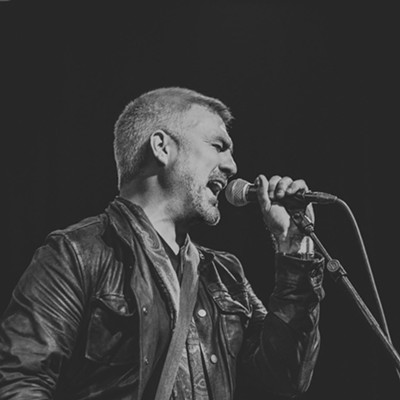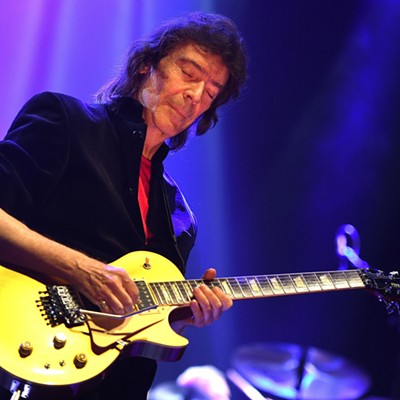Hank Topless calls his music honkytonk countryblues, jamming it all together into two words, obliterating the spaces in between so what's left is its own new thing.
No surprise, he does the same thing with the music itself.
As he tells the story of his new album, the nine-song, solo-acoustic Big Black Heart, Topless talks about how he fell in love with country music as a boy, returned to it decades later, traced those influences back to their origins with blues musicians, and ultimately copped what he could along the way to stitch together his own unique take on the style. But while some performers may hew to the unadulterated vintage sound, Topless has always been adamant about making modern songs with the old tools.
"I don't sing about going to do the milking chores or tapping my foot in my overalls while smoking a corncob pipe or being in the fields or getting on my horse and riding the range," he says. "Although the old lonesome feeling of the back-porch country blues does drive me, I don't see what I'm doing now as retro music. It's not supposed to imitate. It's not intended to regurgitate somebody's thing. I think of this and I live in this as music for now."
Big Black Heart, the first Topless album since 2011, is released on the Lonesome Desert Records, a new local label dedicated to raw, stripped-down acoustic music. The songs fit the blues format, tending to deal with losing something, missing something, regretting something, going away from somewhere, and having to deal with something that's gone.
"I can feel so intensely about things. If I like something, I really like it, to the point I can hurt myself with it. And I've done it with music, I've done it with women, I've done it with drugs," Topless says. "That's the emotional part, that's the heart. But why is it black? Well, listen to the fucking lyrics. I'm a fucking blues singer. That's the reason for the title."
Before he found the blues, Topless discovered country music, at eight years old, having just moved to the White Mountains, spending an hour each way on the school bus, where the driver would play an AM station out of Phoenix.
"Going to this rural area and hearing this music was a big culture shock for a little kid. I had five years listening to that music, but I didn't acknowledge to myself that I enjoyed it in those years. That took until my late 20s. I discovered an AM station down here in Tucson, that played the newer things, but also the same music I heard when I was a little kid, the same songs even," he says. "I'd already been playing music professionally for years, but when I heard this stuff again in my late 20s, it was like the top blew off of my head. I was enjoying what I was doing musically, but there was something in my head telling me I was wanting to go somewhere else with music."
So Topless changed his style and after a time began playing solo acoustic gigs, something he'd never done though he was already in his 30s. Indulging his drive to learn more and more, Topless got a master's degree in composition, studying the intricacies of form and structure to improve on his own songwriting.
That foundational knowledge became crucial years later when Topless, stuck in prison (on drug-related charges) without a guitar, managed to pull off a particularly fruitful period of songwriting. Understanding the structure, he'd have entire songs all but finished by the time he got his hands on a guitar.
"The thought process, the analyzing and editing internally, was no different in there than it ever was before, or as it is today. The difference was the time. I could really sit on my bed and scribble and scribble," Topless says. "That experience, by and large negative, is important in the formation of some of the music on this album and without it, I don't know that the songs would have been as dense and as filled out and considered."
The songs on Big Black Heart range from newer material from the past year, to songs that came at various times over the last 12 years or so. Much of that time, Topless didn't play in a band, devoting his time to advancing on the guitar, finally having a breakthrough in his fingerpicking style by studying the Reverend Gary Davis and Mississippi John Hurt.
"I was in a terrible place. I'd been incarcerated and had a lot of problems, but I was still going to play music. The easiest way to do that, and to make money doing it, was to play solo," he says. "The Red Room was gigantic in my being able to come back. The guy who ran the bar liked what I did and kept booking me. So from 2009 until it closed I was commonly playing there. The Red Room allowed me to put into practice what I realized I had to do to my guitar style. Prior to the incarceration experience, my guitar playing was different. It's not great now, but it was much more basic then."
Songs usually start for Topless as a bit of a lyric, generally what will become the hook of a song. The meter, the vocal register, the key and guitar accompaniment follows quickly, matching the feel of that first impression.
"The thematic material corresponds quite well with the themes that have always been in country music or blues music. By and large, it's about the dark side of life," he says. "It's not meant, in early examples or in my case, to bum somebody out. But it is an expression of confronting, grappling with the impact of life as it moves along. People will remember all the times they got arrested. They'll remember all the times they got divorced. They remember all the important people in their lives who passed away. Those are old themes. It's part of the drama of being alive."
What a listener can find in the blues is someone who understands, a way to cradle a bad feeling and turn it better. Singers sing about being nowhere, but it's a reminder that there are nowheres everywhere. But Topless doesn't have a sense of trying to speak for others in his songs, or stumble onto any universal truths.
"It's not even supposed to have someone after it goes by say 'Ah, he really said it there.' That's great if it does that, but it's more about being a succession of impressions. More than anything, I'm wanting to wrap these impressions around people's minds. I want to take them wherever the thing might take them," he says.
Topless considers his lyrics more offbeat, an update on the old styles, a way to adopt the lonesome feeling, the earthiness and honesty of it, and put forth his own idiosyncratic style.
"In getting my stride as a composer in this language, what's working is an extension of that traditional core. It's the way it's put across, what I'm doing with it," he says. "That's on purpose and I'll die doing that."
Hank solo in 2015:







